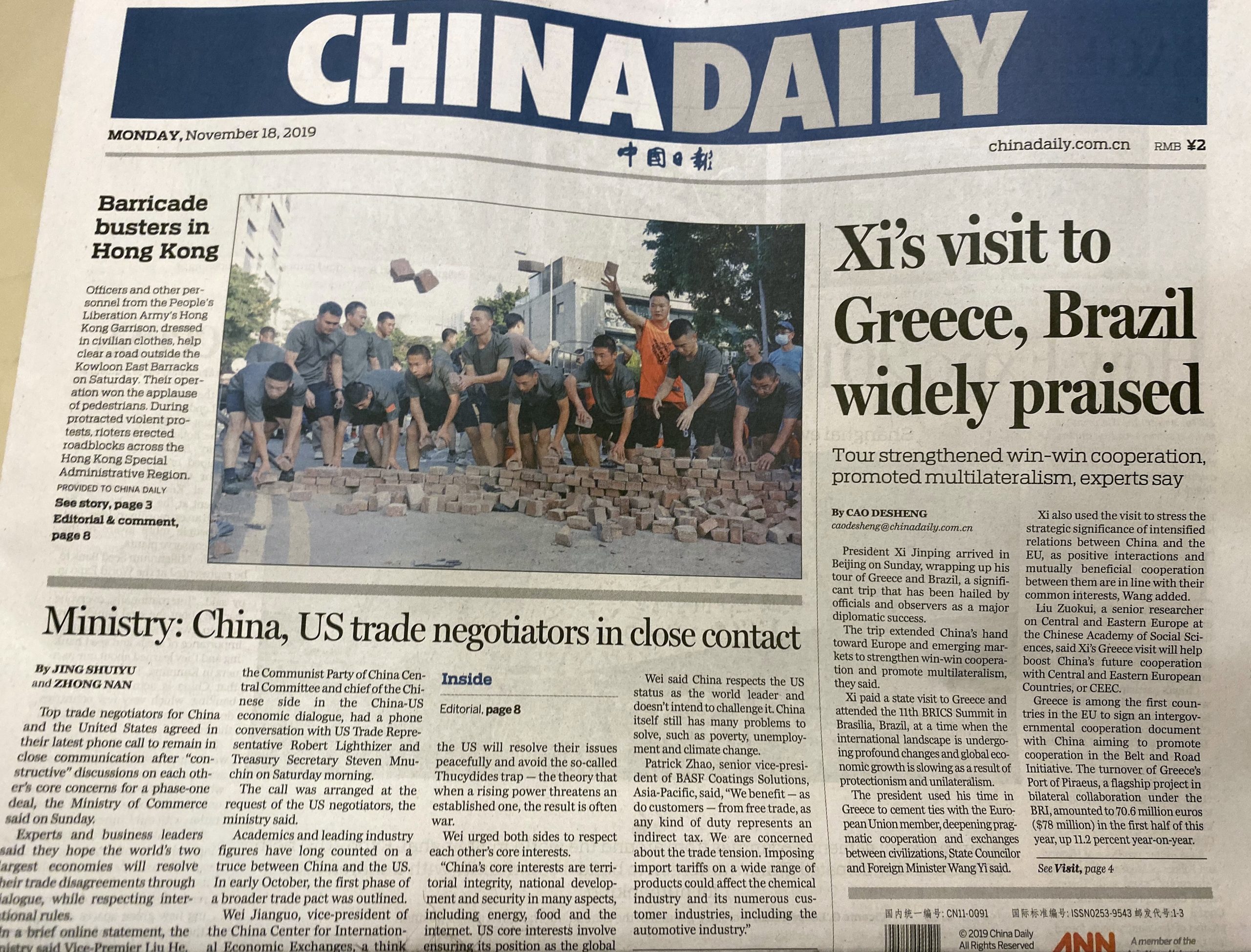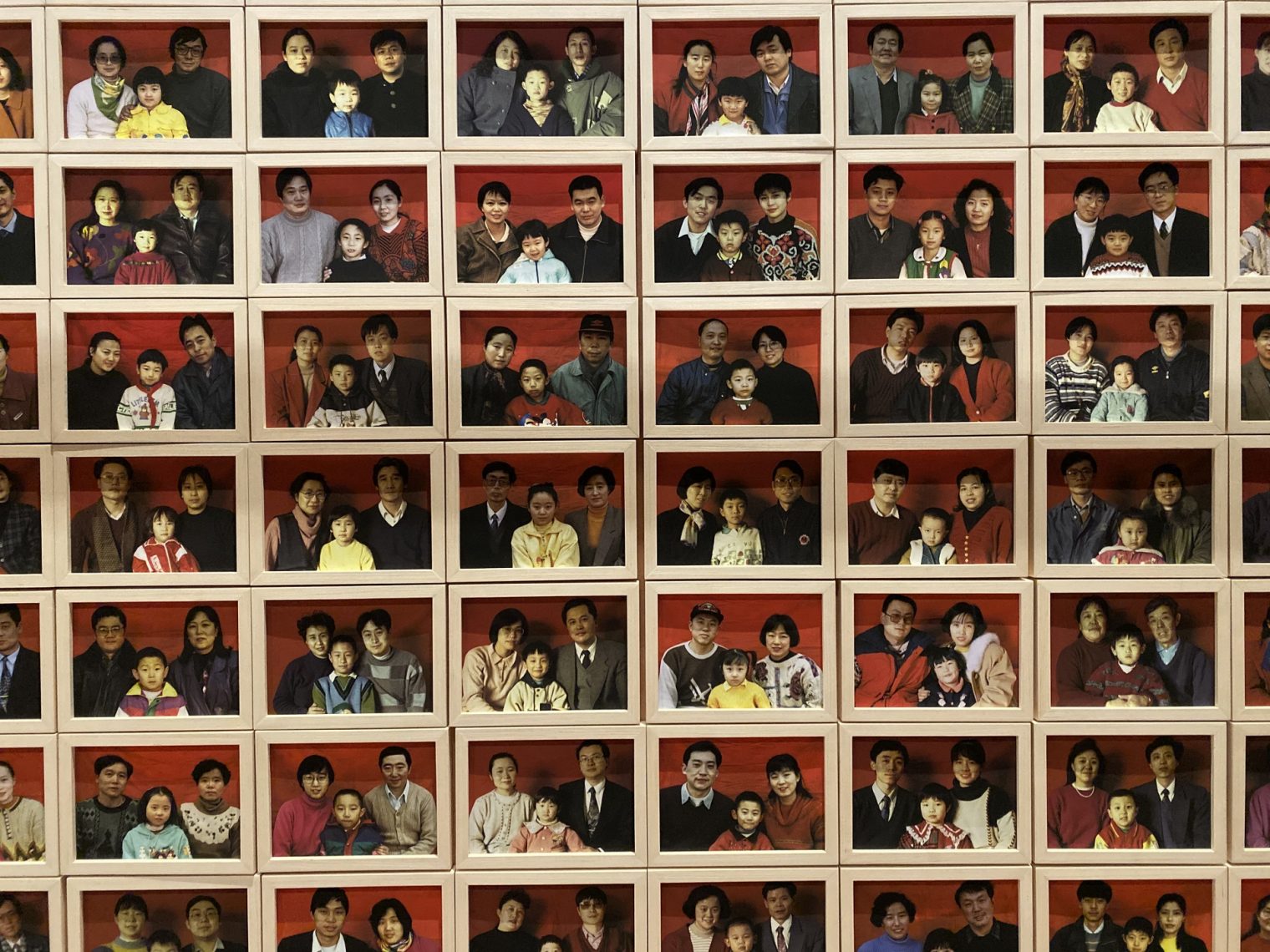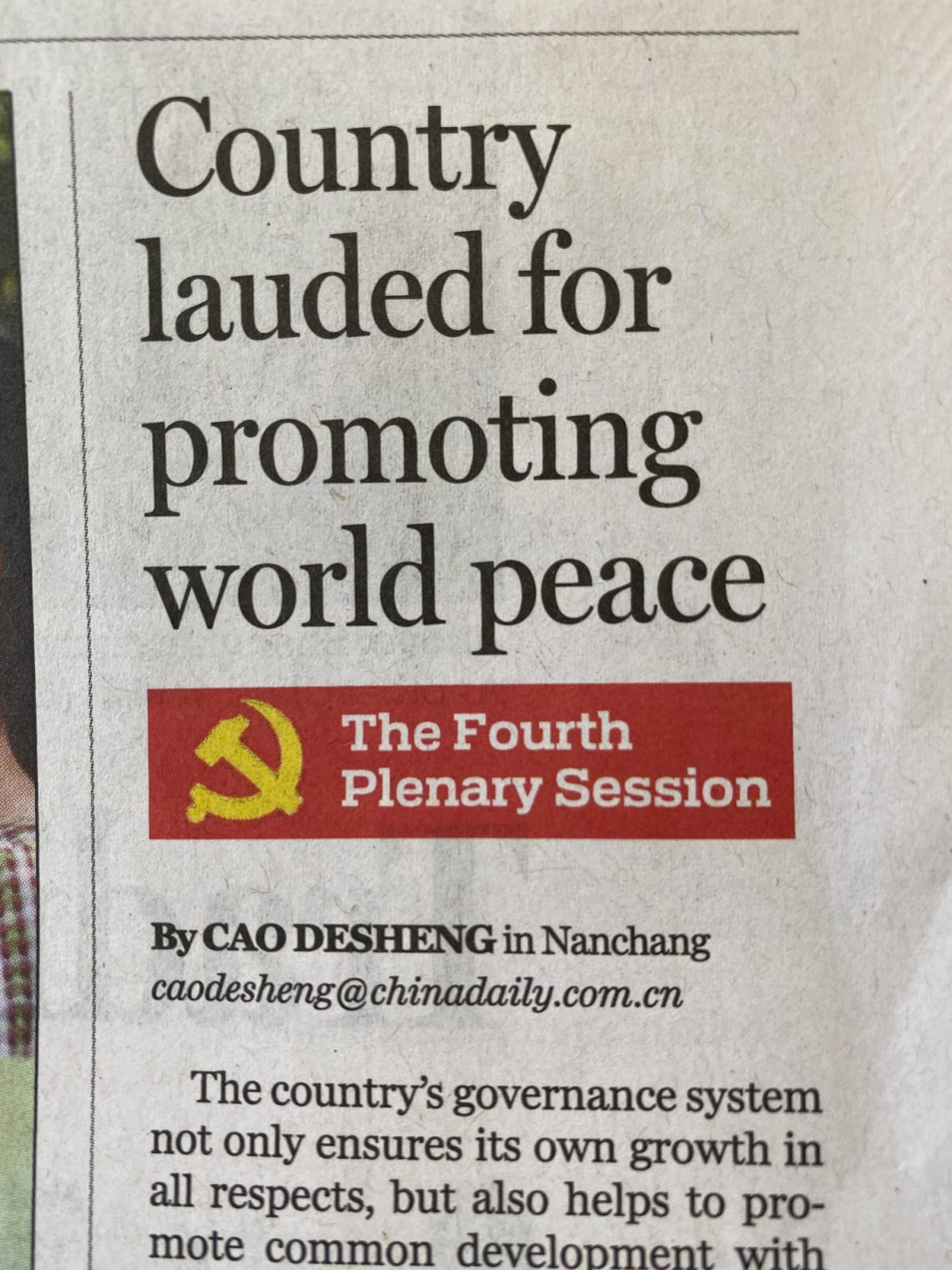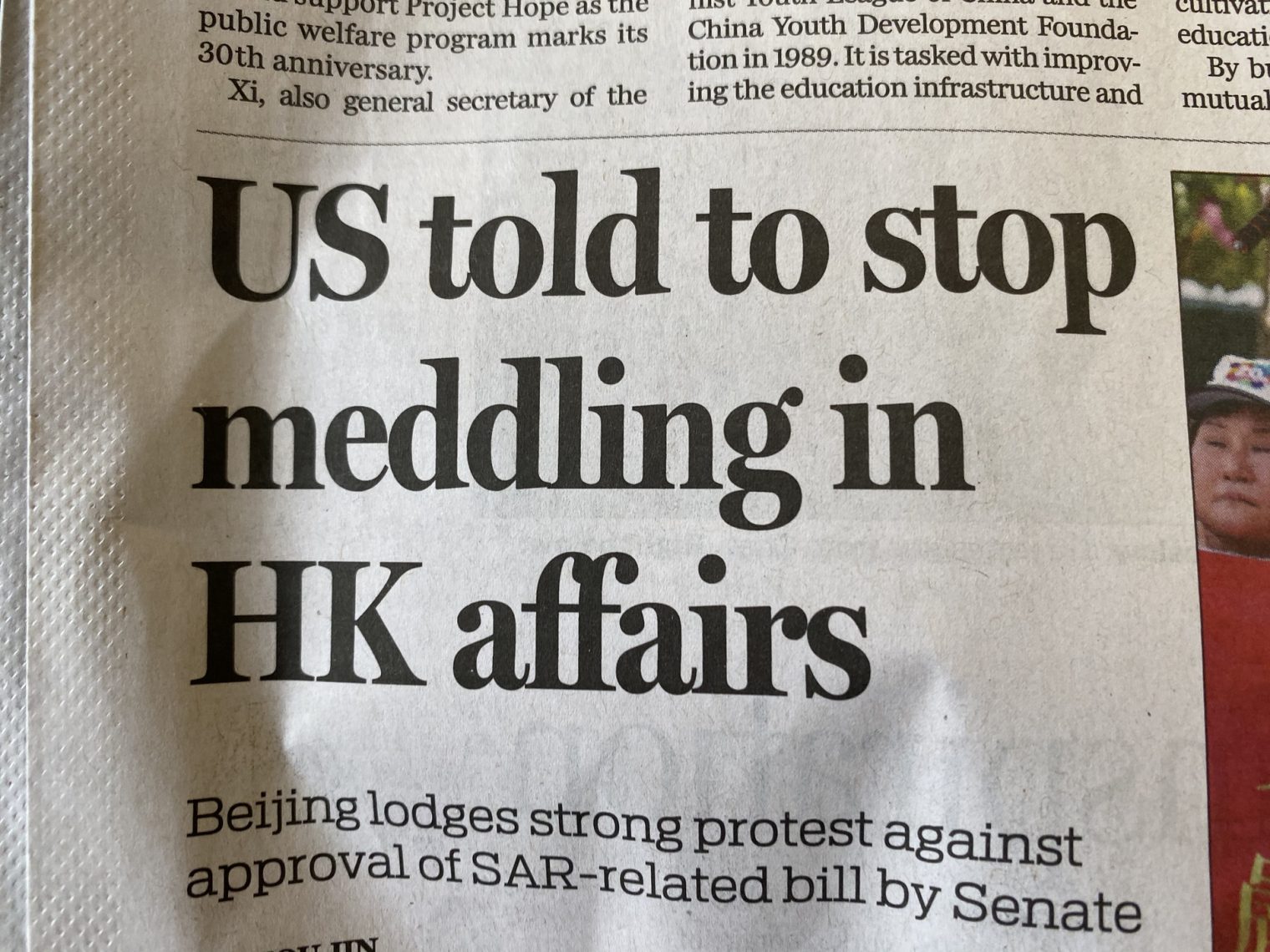I met a lot of people in China who were unhappy with some of the Chinese government’s policies, notably the Great Firewall and control of the media (the stuff that is used to whip up Westerners’ outrage was not foremost in their minds; nobody mentioned the Uyghurs and when I asked the response was that the potential for domestic jihad required some tough policies, the Hong Kong situation was regrettable, but not obviously the government’s fault).
The level of personal bitterness regarding politics was much lower than in the U.S. To the extent that anyone was blamed, it was a handful of leaders at the top of the Communist Party, not fellow citizens. (The Party has roughly 90 million members, or 6 percent of the population, but this includes people with ordinary jobs as farmers, for example.)
Contrast to the U.S. Even in a one-party state, such as California, there is bitterness and hatred. Bay Area Californians, for example, blame the Republican remnant down in Orange County for preventing them from implementing their Socialist dream (somehow a Republican in Orange County is stopping San Francisco from taxing residents to pay for housing for the homeless, universal health care for San Francisco residents, and the rest of the dream? why can’t folks in the Bay Area give up their Teslas and foreign vacations and move the tent people into apartments?).
On a nationwide scale, given the roughly even split among voters, we are virtually guaranteed to have 50 percent of Americans blaming the other 50 percent for voting for whichever party is currently in power (see https://philip.greenspun.com/blog/2019/11/22/coastal-elite-hatred-of-trump-voters-explained/ for example). This does not happen in China. One business executive said “I explain our politics to friends from Texas by saying ‘imagine that the mafia took over control of Dallas.'” Certainly he seems to have little affection for the Party (referring to them as a “mafia”), but he recognizes that there is nothing he can do to change it and that none of his neighbors are to blame for the Party’s control of China. So he concentrates on his business, his family, and his friends, enjoying what he says is a superior lifestyle to what he had in New York City (elite U.S. MBA and job at a top Wall Street bank). He says that there is more practical freedom of speech in China compared to the U.S.: “In China, the Party is clear about what they don’t want you to disagree with publicly,” he noted. “but in the U.S. the boundaries of acceptable speech change from week to week.”
How about freedom of the press? That’s an unqualified good, right? We love the First Amendment, I hope (though we don’t want “hate speech” or anything that makes us and our allies feel unsafe). Consider the New York Times. They run article after article intended to make the majority of Americans resentful of our richest neighbors. These include statistics on inequality that are cooked by valuing the services that a poor American receives at $0. So a person who is guaranteed the lifetime (and often multi-generational) right to live in a $1 million market-value unit in the center of a gleaming city, guaranteed a $30,000/year market-rate family health insurance policy, guaranteed a lifetime of free food and free smarthphone service, etc. is considered to be poorer than the poorest resident of Malawi.
Even if the data were not cooked to the point of absurdity, an article about inequality in the broad economy has no value to more than 95 percent of Americans. Unless they live in a swing state, their vote does not count and they have no influence on national politics. The English-language media in China contains a lot of puff pieces on the good works done by the Chinese government, e.g., flatland Chinese troops who are stationed in Tibet rescuing injured tourists, but the propaganda angle is clear and the reader can ignore it all if desired. Consider how much time Americans spend obsessively tracking the Mueller report (see my recent bookstore photos from Denver), the quest for Trump’s tax returns, the impeachment process soon to be entering its fourth year, etc. Except for those who are in Congress, wouldn’t they have been better off using that time for dinner with friends, reading a book, or learning new skill? Here’s a selection of English news offered at my hotels:

(Note that government control of traditional media has, according to locals, no effect on their practical access to information. “We can learn anything we want about Hong Kong on social media,” said a 24-year-old.)
Maybe the system of government as conceived by our Founding Fathers was a good one (especially since it came with the ability to steal the rest of North America from the Native Americans, which the British had prohibited), but stretched from 3 million to 330 million and combined with a reader-hungry media it results in unhappiness? Or maybe democracy itself is inherently a system in which neighbor will end up hating neighbor (or spouse)? Every government policy results in winners and losers (even building a bridge will harm the livelihood of people who previously operated ferries) and therefore every government policy has voters on both sides. Folks who are harmed by a government policy will therefore inevitably come to hate a majority of their fellow citizens on that issue (since presumably it wouldn’t be a policy if a majority of voters did not support it)? The mutual hatred level gets amped up considerably when people take the position that their vote on an issue is due to their passion for “justice” (a universal) rather than simply self interest (potentially personal).
Not being a Mandarin speaker, it is a bit tough to say whether people are actually happier in China than in the U.S. overall. Out and about, the Chinese actually did seem more content, consistent with the Gallup Global Emotions survey. 87% of Chinese experienced “enjoyment” versus 82% of Americans, an achievement given that the GDP per capita is lower in China; “worry” was at 29% in China and 45% in the U.S. (imagine how worrying it is for a Californian or New Yorker to think about what crimes Trump might commit next!), “anger” and “sadness” were substantially lower in China as well. Despite consuming more opioids than the rest of the world combined, Americans experienced more “pain” than people in China! Maybe we all need higher doses of fentanyl?
Family life in China seems happier. Maybe it is the one-child convention (no longer a law), but it was common to see married couples out with their cherished offspring as a unit of 3. In the U.S., by contrast, Parent A might be with Child 1 at Activity X while Parent B is with Child 2 at Activity Y. (Or the child might have only one parent, incentivized with welfare and/or child support cash, unlike in China where being a “single parent” from the start is simply illegal.)

Readers: What aspect of American political and press freedom actually contributes to the happiness of Americans?
Related:
- trust in fellow citizens in China versus the U.S. (63 percent versus 38 percent who say “most people can be trusted”; China is at about the same level as Sweden (certainly Shanghai taxi drivers are a lot more trustworthy than their old-school New York counterparts!))



Humans have always preferred single party rule & US’s voters definitely want a single party now. No-one in 1789 wanted a democratic system but the philosophy in those days was “no pain no gain”.
You mean “one-party rule makes the people in power happier”. Here in Hongcouver, the rich Chinese are leaving back to China, but if China is such a happy country, why do they not sell all the real-estate they purchased in Canada and move not only themselves, but their entire family back? Why do they let their families be unhappy in Canada? Surely all their great wealth would result in better returns if invested in China instead of Canada?
https://www.scmp.com/news/world/united-states-canada/article/2125153/many-millionaire-migrants-are-exiting-canada-leaving
As for the question about American happiness, I will let the Americans on this blog comment.
I’m going to sit this one out for a couple of days. I’ve harangued the rest of your readers too much over the past several, it’s excessive. I don’t have any Kumbaya advice, either, because I don’t think there is any. These situations have to take their unnatural course until there’s a crisis, which I think is coming, and we’re going to need the 2nd Amendment as well as the 1st, and I say that with absolutely no joy whatsoever.
Obama always says if you like your Alex you can keep your Alex!
Alex: Have you considered the possibility that there won’t be a crisis or anything else dramatic? Quite a few European countries ending up stagnating after decades of dramatic growth and change. What stops the U.S. from simply stagnating under the weight of its welfare state? The stress from large-scale immigration, which the Europeans did not have during their experiment with a lavish welfare state?
Phil,
The odds that China doesn’t have a big economic crisis that rocks the status quo seem pretty low.
https://twitter.com/EmmaMuhleman1/status/1168275836723765248
The scale of bad debt that has built up in China is totally unprecedented in world history.
Of course, they’ll take down the world economy and the USA with them. So it’s not like it’s something I’m rooting for.
@Philg: Yes, I have. It’s possible. I’m a bit of a catastrophist when it comes to my outlook, and that’s because I’m anguished over this country’s avoidable mistakes, and I look at the plight of the people in Hong Kong and want to scream. I should probably cheer up and realize that sure, the United States might come to resemble a third-world nation and lose most of its geopolitical and strategic importance, not to say most of the things that ever made it a truly great country, but it probably won’t disappear in a violent implosion. I just won’t want to live in it, not that I’ll have any choice.
Jeez Phil, even for your standards this is quite a stretch.
Case in point: Hong Kong – did you talk to people there?
They can actually make the choice you’re asking, they can speak mandarin and they are poised to lose an unwinnable fight. Yet their answer is loud and clear.
The beginning of the third paragraph supplies a “no” to the title. I don’t think the number of parties is a factor, or is at most a minor one. The big difference is that the US is in its terminal malaise (along with the western world generally) while China is still in a golden age.
The mouse utopia theory predicts that China’s turn will come after a sufficient number of generations of prosperity. China has a few more decades to go before their decline sets in, thanks to Mao having kept them poor.
But Hong Kong was not kept poor by Mao. The hatred that Hong Kongers show towards their mainland compatriots looks similar to the hatred that white western progressives show to their own “deplorables” and I think both hatreds arise from the same reason: their respective populations have (broadly speaking) diverged into two groups. In China the divergence coincides sharply with geography and political jurisdictions but those features are incidental.
“Chinese public opinion now does not reflect what it would be in a more open political system. This is not because Chinese public opinion polling is all bad (though on many issues I think the numbers are clearly suspect), but because authoritarian control has frozen the underlying forces that naturally create divisive political identities in more democratic societies.”
http://scholars-stage.blogspot.com/2019/09/public-opinion-in-authoritarian-states.html
Are you sure that a difference in government would lead to differences in answers to the Gallup poll cited in the original post? They asked questions such as “Did you experience the following feelings during a lot of the day yesterday? How about physical pain?” Unless a government tells people “You’re not allowed to have an aching back”, should we expect the government to have a big influence on the answer to this question?
(We would expect bias from age, though! China and the U.S. have roughly the same median age. Compared to the U.S., Mexico has fewer people reporting pain, but the median age is 10 years younger than the U.S. median.)
philg, It could be better to think of China as a collective, more like a beehive social structure. The collective will naturally form a one party government, since individualism does not exist in a collective. The only people with any individual thought will be at the top of the collective, this thought will be passed down into the collective. If the top of the collective is happy this will be passed down to the rest of the collective The government does not need to tell people that they are not to have an aching back, if the queen of the collective does not have an aching back, nobody else in the collective will have an aching back. The beehive social structure would also explain the welcoming nature, the collective has analyzed you (which they have even before you landed) and concluded that you are not a threat, you will be treated very well and everybody in the collective will tell you that it is a happy life in the collective. But do anything wrong against the collective and the collective will make sure that you do not have a happy life.
Beehive society: a new concept for observation of China’s social-economic transformation
https://link.springer.com/article/10.1186/s41257-018-0013-3
Or in the famous words of a famous captain “We have engaged The Borg”
https://www.washingtonexaminer.com/opinion/a-real-borg-collective-xi-jinpings-china-is-americas-defining-challenge-in-2019
I spent a semester there in the mid 90s and had a Chinese roommate, who I got to know a bit more well. Several observations:
1. The students allowed to room w foreigners were all pledging the Communist Party. They wanted to make sure they had their ideology properly calibrated before permitting a bolus dosage of foreign exposure.
2. When my roommate was inducted to the next rank, it was a moment of great pride. As much as I disagreed with the party at large, I could see why this meant so much to him and his family. To get ahead there as a normal person meant playing along with the system, not unlike here. Just different systems.
3. After he was inducted, I asked him late one night, “if you were allowed to change anything in society, what would it be?” I asked it several times, but all of his answers were tiny—like changing the font on street signs kind of stuff. If you asked an American college junior that question they’d offer three ways to rewrite the Constitution. My roommate wasn’t taught that he wasn’t allowed to think for himself, but he was taught to keep it to his own rank, like a junior company man.
4. In Beijing, even in the relatively freewheeling mid-90s, nobody wanted to talk too much. Travel a few hundred miles and they opened up more. Today the ears and eyes aren’t just walking the streets of the capitol, they’re on every street corner and in your internet connection.
The recipients of harvested organs are probably a notch happier than the donors.
Overall your review of China is pretty glowing, but you returned to the U.S. to live so I guess we know your actual opinion.
PoohBear: A failure to emigrate to China is not proof of a low opinion of China. First, China has not been blessed with a sufficient supply of elite American Democrats to preach to them the virtues of open borders.
https://qz.com/1163632/china-still-has-the-smallest-share-of-incoming-migrants-in-the-world/ says “According to recently released estimates from the United Nations, as of July 2017 there were almost exactly 1 million migrants in mainland China. (People born in Hong Kong and Macau now living in China are considered migrants by the UN.) That’s just 0.07% of all people in the country, meaning China has the fewest share of migrants of any country in the world. By comparison, migrants make up 15.6% of the US population.”
The article says China has a “restrictive immigration policy” and “only about 10,000 foreigners have been granted the Chinese ‘green cards,’ which allow permanent stay.”
China is happy to welcome stupid white people who arrive to see the UNESCO World Heritage sites. They’re also happy to put us back on the plane to where we came from.
Second, although there are a lot of things to like about a lot of countries on this planet, I personally would not want to emigrate to a country until I had learned to read and speak the prevailing language. A friend says that taking Chinese at Santa Clara Community College was much harder than anything he did to earn a Ph.D. in Physics. I am not optimistic about my chances of becoming fluent in Mandarin or being able to read a menu!
My experience is from the mid-2000s, and is no less anecdotal, but was in many respects very similar to the one that Phil recites.
I got to know some Chinese nationals very well over the course of several years in Beijing, to the point where I believe they would speak honestly with me. After a while, we did come to discuss political topics.
If I could summarise in one sentence the feelings of the people I knew regarding democracy, it would be “Why would I want to choose our leadership?”
I came away from my years in China with the strong belief that the average Chinese person — one who keeps their head down, doesn’t rock the boat, doesn’t aspire to activism, but just wants to lead a good life and provide for their family — is more free than the average American. Certainly their government appeared to play a much smaller role in their day-to-day lives.
The way to destroy America is divide us. Get Conservstives hating liberals and vice versa. The way to destroy Islam is to divide it. Get Sunnis fighting Shiites. Sadly, the US media is very good at stirring up controversy and creating division. It sells the news and generates attention. Censorship destroys opposing opinion and this freedom. But it shuts down controversy. I would like to think there’s a middle ground somewhere, like the US in the 1950’s with 3 news agencies. A news Oligarchy that also respected the offices of government and held stories and such. Maybe the 1960’s ended all that forever. We will see in the next major crisis, war, natural disaster, depression. I would like to believe that in times of crisis we set aside our petty politics and become citizens and politicians become statesmen. That’s when I become proud of the United States of America.
Philip – not sure where you get the idea that Chinese are happier. They seem to score fairly low on the World Happiness Index. Looking at the current results in that report it seems pretty clear that cold dark winters seem to make people happy and not one party rule!
I’m not sure why the multi-question Gallup survey gives different answers than the World Happiness Index, which I think is based on just one question (also asked by Gallup). See https://africacheck.org/2018/05/07/analysis-what-does-the-un-happiness-report-really-measure/
Indeed, Tanzania (153rd), Rwanda (151st) and Botswana (146th) all come in near the bottom as the least happy countries. Several countries that are in ongoing wars or military conflicts rank higher.
Libya has been in a constant state of conflict since the 2011 uprising which ousted Muammar al-Qaddafi, yet is comfortably in the top half of the ranking in 70th place. Somalia, which has been embroiled in a civil war since 1991, comes in 98th. By comparison, relatively stable South Africa is 105th, while Nigeria is 91st and Kenya is 124th.
The fight against the Islamic State in Iraq has displaced an estimated 5.4 million people since 2014. Yet at 117th in the happiness ranking, Iraqis still appear to be happier than Namibians (119th) – whose former president Hifikepunye Pohamba received the Mo Ibrahim Prize for “excellence in African leadership” in 2014.
One hypothesis is that the Chinese don’t answer this single question for the World Happiness Index with a 10 because they know that life will be better next year and the year after that. In a country where per capita income doubles roughly every 10 years it doesn’t make sense to say that one has achieved the “best possible life” right now. That would make sense to say, however, in the U.S. or in most European countries where per capita GDP growth is minimal (the exciting GDP growth numbers for the US aren’t adjusted for population growth, so they make us look much better than Japan, for example, when in reality the per capita growth is similar).
——- for reference, the single question that feeds the Index
“Please imagine a ladder with steps numbered from 0 at the bottom to 10 at the top. Suppose we say that the top of the ladder represents the best possible life for you and the bottom of the ladder represents the worst possible life for you.
“On which step of the ladder would you say you personally feel you stand at this time, assuming that the higher the step the better you feel about your life, and the lower the step the worse you feel about it? Which step comes closest to the way you feel?”